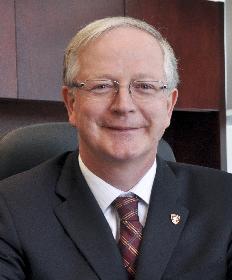Professor Robin Drew
Dean
Faculty of Engineering and Computer Science
Concordia University
As Dean of Engineering and Computer Science at Concordia University, Robin Drew led a Faculty consisting of five Departments, a service teaching unit, 3,300 undergraduates and 2,250 graduate students, over 170 faculty members, and 125 technical and support staff with a budget of close to $60 million.
The Faculty implemented a Strategic Action Plan (2009-14), which the Dean and his academic team developed in 2009. It was aimed at bolstering research and teaching in identified Signature Areas, which are energy, environment, aerospace, nanotechnology, telecommunications as well as cyber security and forensics. During his tenure, the Ministry approved two new PhD programs: one in information systems engineering and the other in industrial engineering. At the undergraduate level, all seven undergraduate programs received full CEAB accreditation in June 2012 for six years with no conditions. Furthermore, all five departments now offer master’s (course and thesis) and PhD programs.
Upon Robin Drew’s arrival at Concordia, there were no NSERC Industrial Research Chairs in the Faculty. Under his leadership, four have been awarded. Two institutes were established to build on existing Faculty strengths, one in water, energy and sustainable systems (CIWESS) and the other a fully-fledged teaching and research institute in aerospace (CIADI). He also secured three new Canada Research Chairs (two CRC Tier 1 and one CRC Tier 2) and renewed a number of existing CRCs. All the above will drive the Faculty’s strategic research and teaching directions for the next five to ten years. The research budget increased by ~30% from 2008-2013, with a similar increase in graduate student enrolment, particularly at the PhD level.
The Faculty has a large international student body, which has motivated missions to India, China, Latin America and the Middle East. Robin Drew was involved in the latter three, representing Concordia in the Canadian Provincial Premiers’ 2008 mission to China. He also took a special interest in advancement and development and was successful at raising more than $1 million per year in philanthropy for such things as scholarships, laboratories and a Capstone Design Centre from both individual alumni and corporations such as Bombardier, CISCO, Pratt and Whitney Canada and Hydro-Quebec.
Previously, at McGill University, as Chair of the Department of Mining and Materials Engineering, Robin Drew provided leadership and stewardship for eight years. During his tenure, the department made a transformation away from traditional metallurgy, mining and processing to become a modern department of Materials Engineering. As a result of his initiatives, the department developed new research activities in aerospace, light materials, biomaterials and nano-materials through the judicious hiring of new academic staff in both materials and mining (including a CRC 1 and 2) and by obtaining significant infrastructure grants (CFIs) to re-equip laboratories.
Robin Drew’s research expertise is in advanced materials, primarily specializing in ceramics, metal-ceramic interactions, composites, joining and he has recently developed an interest in metal foams as well as biomaterials. His publication record is extensive, having published 120 journal articles and 80 conference articles. He has a steady and successful granting history, having graduated many master’s and PhD students who have gone on to successful careers in either academia or industry across the globe. Throughout his academic life, he has maintained strong contacts with national and international companies as well as collaborating with several research groups both nationally and internationally, notably in Mexico and most recently in the United Kingdom, as an Overseas Fellow of Churchill College at Cambridge University.
Over the past 25 years, he has developed extensive experience in Materials Selection and Failure Analysis as a consultant to both local and national firms. He has been author of more than 90 reports related to Failure Analysis and Materials Selection problems. Hewas an Associate of SA3, an aircraft accident consultancy. He has also acted as an expert for several Canadian law firms, including McCarthy Tétrault and Davies Ward Phillips &Vineberg, and has worked as an expert witness in court on numerous occasions.
He acts as referee for various high-impact Technical Journals, including: Acta Materialia; Scripta Materialia; Materials Science & Engineering; American Ceramic Society; Metals and Materials Transactions; Materials Research Society (MRS); Journal of Materials Science; Composites and Canadian Metallurgical Quarterly. He often reviews grant applications for NSERC as well as CSA, AIF and NSF.
Throughout the years, he has been involved with professional associations and has been a scientific advisor and organizer of several international conferences. He is a Fellow of the Canadian Academy of Engineering and Engineering Institute of Canada as well as member of the Professional Engineers Ontario (PEO).

